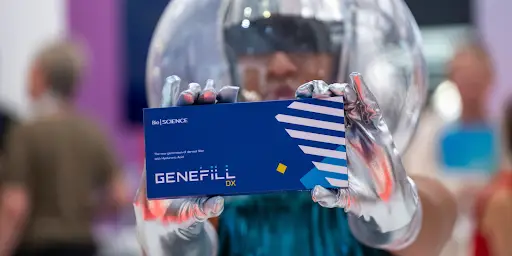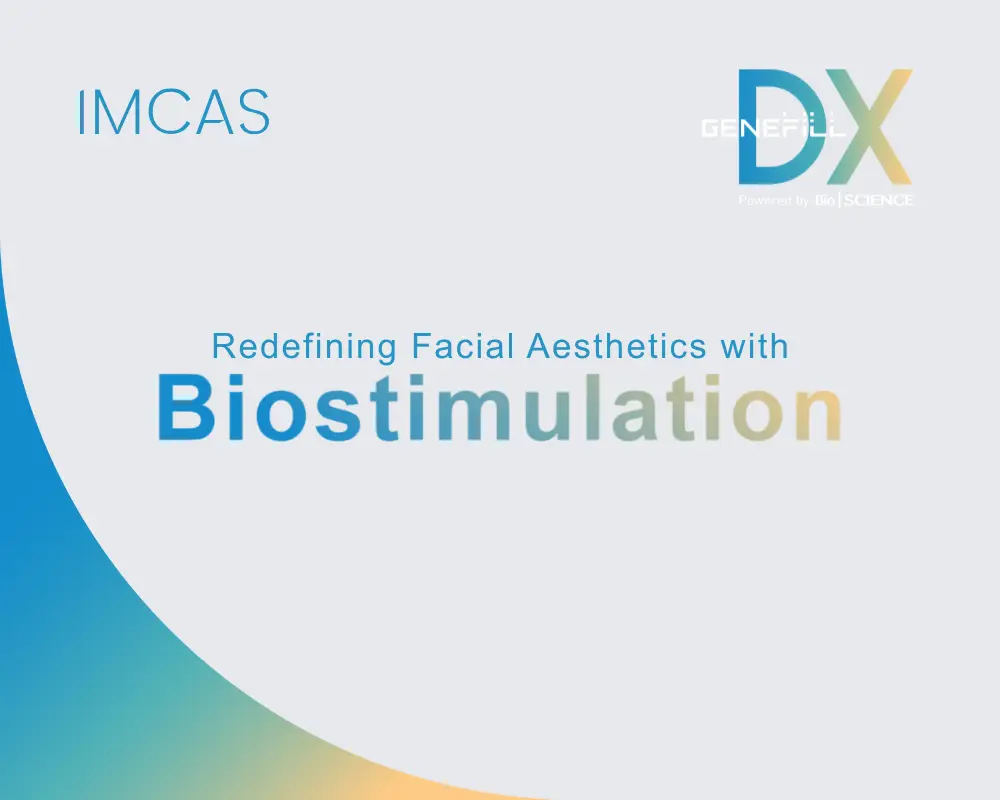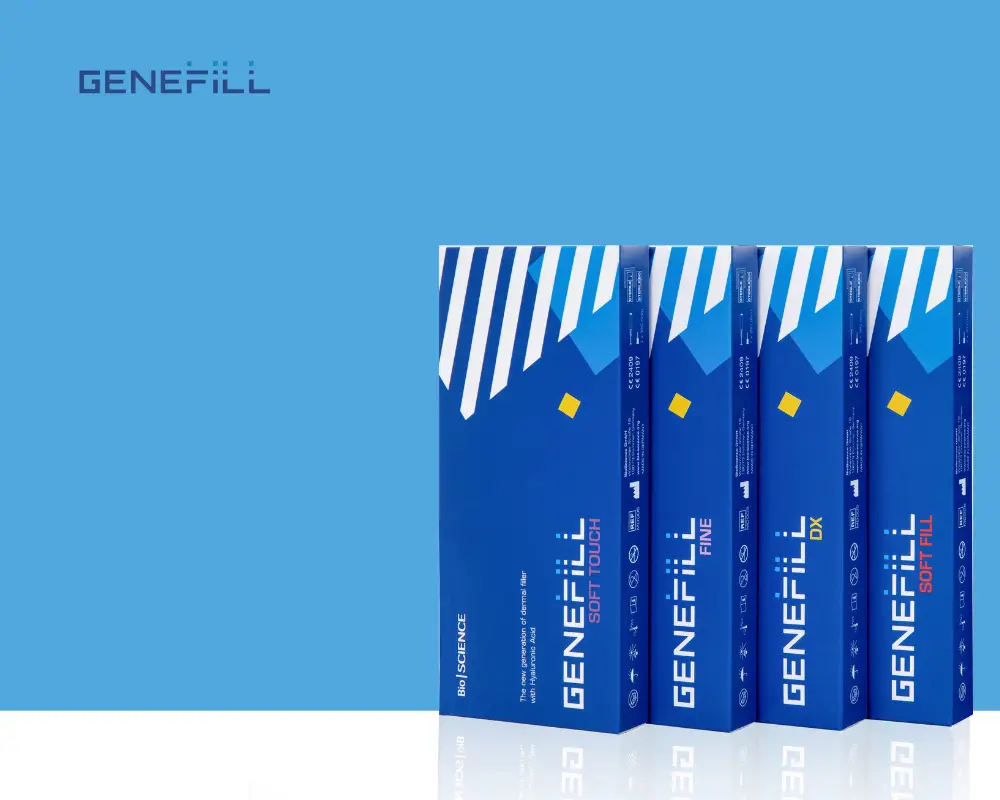When we think about stress, we usually picture a lot of mental turmoil, like sleepless nights, racing thoughts, or perhaps even the occasional upset stomach. But here’s something you might not have expected - stress can show up as physical signs on your skin, too (and often, it’s one of the first places it does!).
Whether it’s breakouts before an important event, your complexion suddenly looking dull and tired, or deeper signs of aging like volume loss, the connection between stress and health is real and more common than you’d think. Your skin isn’t just another layer on your body; it’s your body’s largest and most expressive organ. It responds to what’s happening on the inside, especially when you’re feeling overwhelmed. 1,2
In this blog, we’ll explore the effects of stress, what those changes mean, and most importantly, what you can do to care during tough times so that you can feel confident in it again, from the inside out.
The Science Behind Stress and Skin
Let’s start with what happens biologically when you’re anxious. Your body releases a hormone called cortisol - often referred to as the “stress hormone.” While it plays a key role in your body's fight-or-flight response, chronic high levels of cortisol can lead to inflammation, immune suppression, and hormone fluctuations.1
To put it simply, for your skin, that means:
- Increased oil production, which can clog pores and trigger acne
- Disrupted barrier function, leaving it prone to dryness and irritation
- Slower collagen and elastin production, reducing firmness and resilience
- Impaired wound healing, making it harder for blemishes or damage to heal
- Heightened sensitivity, redness, and inflammation
In other words, your body reacts to stress just as much as your mind does - and the signs are often written (quite literally) all over your face.
Signs of Stress-Related Issues
You don’t always need a microscope to see the effects, as stress can make its presence pretty obvious in your health.2 Here are the most common symptoms linked to chronic stress:
- Breakouts or acne: Especially along the chin, jawline, and cheeks, where hormonal fluctuations hit hardest.
- Premature wrinkles and fine lines: Accelerated collagen breakdown leads to early signs of aging.
- Dull, uneven complexion: Reduced blood flow can leave it looking tired and even sickly.
- Flaky or oily patches: It throws off your skin’s natural balance, making it unpredictable.
- Heightened sensitivity: Your skin may become much more reactive to products or environmental triggers.
These are more than just cosmetic concerns - they can be warning signs that there’s something out of balance.
Facial Volume Loss: A Deeper Sign
One side effect of chronic stress that we usually ignore or don’t even realize is related to it is facial volume loss.
When your body’s cortisol remains elevated over a long period of time, it also depletes collagen and elastin - the very structures that give your face its youthful contours.1 This can result in:
- Hollow cheeks
- Deeper nasolabial folds and marionette lines
- A softer, sagging jawline
- Tired or gaunt appearance (even when you’re well-rested)
This type of aging goes beyond the surface, and no topical cream can fully restore volume once it’s lost. That’s why it’s crucial to protect your skin’s structural integrity, especially during periods of prolonged stress.
How to Care for Your Skin When Stressed
While you might not be able to eliminate stress entirely, you can definitely take steps for better protection and care. The key is to focus on soothing, strengthening, and supporting.
You don’t need an overly complex routine or harsh treatments. The goal is to calm inflammation, protect its barrier, and restore balance with gentle, consistent care. Think of it as hitting the reset button for yourself.
Gentle Cleansing
Start with a mild cleanser that won’t strip away your natural moisture barrier. Since it’s already compromised, it’s important to avoid anything that could increase sensitivity or dryness. Cleansing should leave your face feeling clean and soft, not irritated.
Hydration Is Essential
Stress can lead to moisture loss and a damaged barrier, so hydration is a must. Look for serums and moisturizers containing hyaluronic acid, glycerin, or ceramides. These ingredients attract and lock in moisture while strengthening your skin’s protective layer.
Calming Actives
If your face feels more sensitive and reactive than usual (red, itchy, or easily inflamed), it may benefit from soothing ingredients like niacinamide, aloe vera, and green tea extract. These help reduce redness and irritation while restoring a sense of balance to your complexion.
Antioxidants for Defense3
Cortisol, the primary stress hormone, contributes to free radical damage, which accelerates signs of aging. Antioxidants like Vitamin C and Vitamin E help neutralize that damage, brighten your tone, and support elasticity.
Barrier Repair Ingredients
When your barrier is compromised, it becomes more vulnerable to everything from environmental irritants to moisture loss. Ingredients such as hyaluronic acid, ceramides, niacinamide, ceramides, and more help rebuild and strengthen this barrier, improving texture and boosting your overall skin health.
SPF Every Day
Even when it's cloudy or you're spending your day mostly indoors, daily sun protection is absolutely necessary. You will be more sensitive to UV damage, which can intensify signs of aging and slow healing. Applying a broad-spectrum SPF every morning is one of the most protective steps you can take.
But beyond the skincare itself, don’t overlook the foundational habits that support from within. Get enough sleep. Stay hydrated. Eat a balanced, nutrient-rich diet. Move your body regularly.
Addressing Volume Loss with Advanced Treatments
But if stress has already left its mark and you’re noticing deeper signs of aging (particularly loss of facial volume), it may be time to look beyond the skincare aisle.
This is where dermal facial fillers make a powerful, transformative difference. These minimally-invasive treatments offer an effective way to restore lost facial volume without the need for surgery.
Taking it a step further, advanced hybrid fillers are quickly becoming the new standard for facial fillers. They do more than just add volume - they actively stimulate collagen production, offering immediate and long-term skin benefits. These biostimulatory fillers are a next-generation approach to rejuvenation, offering natural-looking results that evolve over time.
Genefill DX, in particular, stands out as a cutting-edge hybrid filler with its unique formulation of hyaluronic acid and dextranomer microbeads to deliver immediate volume while kickstarting natural collagen production for long-term rejuvenation.

Genefill DX: A Next-Level Solution
While traditional fillers are great at temporarily smoothing lines or restoring lost volume, Genefill DX is designed to go further because it doesn’t just “fill”, it also helps rebuild. By working beneath the surface, this revolutionary next-gen hybrid filler supports your skin’s long-term health, resilience, and natural regeneration.
What makes it different from traditional dermal fillers?
Cross-Linked Hyaluronic Acid
This isn’t just about “plumping”. The hyaluronic acid in Genefill DX delivers immediate hydration and volume, smoothing out fine to deep wrinkles while giving a more supple, refreshed appearance. It provides instant and natural results.4
Dextranomer Microbeads
Here’s where it gets interesting. These tiny, biodegradable beads act as a biostimulator, kickstarting your own collagen production.5 Over time, this means firmer, more elastic skin with better tone and structure. It’s like helping your body remember how to support itself again, which is something that becomes harder with age and chronic stress.
Long-Lasting Results
While many fillers fade within months, Genefill DX’s effects can last up to 12 months. That’s because it doesn’t just fill - it revitalizes. The result? Skin that not only looks better but actually behaves more “younger” and healthier over time.
Targeted, Versatile Application
Some of the most common signs of stress-related aging (like hollow cheeks, softening jawlines, and loss of chin definition) are exactly where Genefill DX excels. It’s carefully formulated for areas where structural support and contour restoration are most needed, making it a go-to for subtle yet transformative enhancement.4
Genefill DX is for those who want more than a surface-level fix. It’s for people who want results that look natural, feel authentic, and last longer. These kinds of results are possible because they’re built on your body’s own regenerative capabilities.
Whether you’re recovering from a high-stress period or looking to “future-proof” against it, Genefill DX is the science-backed, skin-smart solution for you.
Education Is the First Step Toward Prevention
Understanding how stress affects your skin helps you to make better decisions. When you know what’s happening beneath the surface, you can make smarter, more confident choices. Whether it's about choosing the right products for your routine or treatments for a much deeper treatment, education is the first step.
Yes, stress is an inevitable part of life. But how it shows up on your body? That’s something you can influence. While you might not have full control over everything, you can take thoughtful, proactive steps to protect your skin and help it stay healthy, strong, and radiant through it all.
Final Thoughts
The connection between stress and your skin is very real, and so are the changes it can cause. But the good news is, you’re not powerless. With the right knowledge, a thoughtful skincare approach, and expert support, you can protect and even restore your natural radiance no matter what life throws your way.
Whether it’s creating a calming daily routine, making small changes to your lifestyle, or exploring advanced treatments like Genefill DX, you have more control than you might think.
So, if stress has taken a toll, and you’re starting to see it in the mirror, now is the perfect time to give your skin the care it truly needs from the inside out.
Want to know more about how Genefill DX can help? Contact us today and we’ll walk you through everything you need to know for a complete facial rejuvenation with Genefill DX.
References:
- Pujos M, Chamayou-Robert C, Parat M, Bonnet M, Couret S, Robiolo A, Doucet O. Impact of Chronic Moderate Psychological Stress on Skin Aging: Exploratory Clinical Study and Cellular Functioning. J Cosmet Dermatol. 2025;24(1):e16634.
- Chen Y, Lyga J. Brain-skin connection: stress, inflammation and skin aging. Inflamm Allergy Drug Targets. 2014;13(3):177-90.
- Patani A, Balram D, Yadav VK, Lian KY, Patel A, Sahoo DK. Harnessing the power of nutritional antioxidants against adrenal hormone imbalance-associated oxidative stress. Front Endocrinol (Lausanne). 2023;14:1271521.
- Ruiz N, Lopez RM, Marques R, Fontenete S. Clinical Outcomes and Safety Profile of a Dextranomer-Hyaluronic Acid Hybrid Filler: A Case Series Analysis. J Cosmet Dermatol. 2025;24(1):e16653.
- Data on file.
.webp)




.webp)


